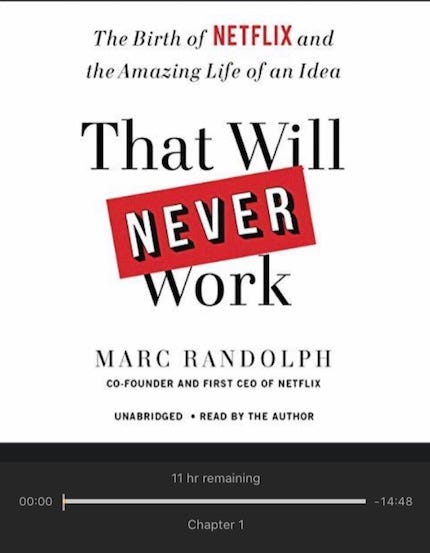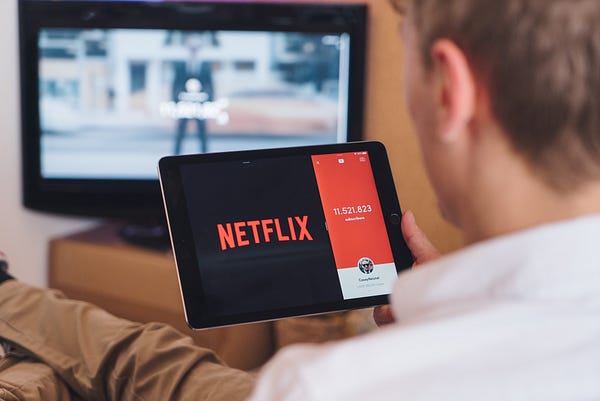That Will Never Work by Marc Randolph

I had just finished the biography from Ken Langone, the founder of Home Depot, and saw this was recommended as one of the next ones for me. I thought it would be perfect. It was great to learn more about the story of Netflix and the journey that the company and the people within it took to get to where they are now. It was a great book and one that I enjoyed. There were not a ton of takeaways for me nor did I find myself challenged by too much within it, but there was some great information and many great messages.
Immediately, I admired the self-awareness that Marc displayed and expressed. It’s not too common from what I’ve seen that people can recognize this within themselves and then also accept that and act accordingly.
Marc knew what he’s a great idea guy and has always had a knack for connecting customers with what they want but also enough self awareness to know he’s horrible at details and follow through.
Wow, what a team. He delved into great detail about who these two individuals were and why they were so essential and valuable for the company. I admired the depth that he went into and the way that he expressed their value to him. I agree with Marc, these two people are both necessities, as is his personality and style — the visionary.
T Smith and Christina Kish were two people incredibly capable, smart, and easy to work with and he said when you find people like that, you need to keep them around. He started looping them into ideas for a company and they were perfect sounding boards. They are great at details.
Christina was a project manager and had years of experience turning visionary ideas into tangible products. She had a real genius for scheduling and a ruthless ability to get things done by the deadline. She was well-versed in the ability to translate a visionary idea out of the realm of possibility and into reality.
T was a specialist in public relations and communication. She knew everyone and everyone knew her. She knew how to write an attention grabbing press release and then also who was important to know in the press. She also knew what to say to them to get them to return her calls. For her, publicity was a kind of stage, and she was the queen.

Wow. What a great strategy. They were incredibly aware and were ready to capitalize on the opportunity that they saw and ultimately created for themselves.
When DVDs were first introduced In the US from Japan, there only about 125 titles available on DVD and they didn’t expect video stores to carry any right away as very few DVD players were even available in the US. The thinking was get in early and beat the video stores to the punch and then customers won’t mind waiting a few days for a DVD that isn’t available in stores anyways.
I like this rule (though I can eat a whole pizza myself so maybe it’ll have to be a 3 pizza rule). I have always admired Bezos for his preparation and vision. Ultimately, Jeff and Marc never partnered up but the opportunity was there which I found quite cool.
Marc met with Jeff Bezos in 1998 shortly after Amazon’s IPO and Amazon had a 2 pizza rule for meetings. If it took more than 2 pizzas to feed the people needed to solve a problem, there were too many people.
Not one person returned the wrong disc?? What? Wow. This is crazy to me but also crazy that this whole ordeal even happened in the first place. I think that the company handled it well and did what was necessary to seek to fix the issue that occurred.
They ran a promotion and created their own DVD of Bill Clinton in regards to his scandal with Monica. They sold it for 2 cents. However, many of the DVDs that were shipped were pornographic videos as the manufacturer confused the similar looking discs. They sent an apology to all 5,000 people and offered to exchange the disc for the correct one on their dime. Ironically, not one person returned a disc.
Amen. Trust but verify. I go by the numbers. Everything I do is calculated and often times when I have a gut reaction or instinctual response I don’t act until the numbers line up. There are, of course, times when the data will not support something but you know it’s right but that’s an outlier and a rare situation. The greatest investors share that they don’t ever go through on an investment deal unless the numbers are right.
Trust your gut. But also test it. Before you do anything concrete, the data has to agree.
This was a crazy crazy thing to me, I almost couldn’t believe it. Yet, I know that it is a necessary part of business, especially in their industry. To attain profitability, sometimes slimming down is necessary but it’s never easy and I know that Netflix really did a great job being intentional and considerate and handled it well for all their employees.
To achieve profitability, it was determined that the 350 employee Netflix needed to go through a series of layoffs. It was emotionally draining and everyone did their best to emphasize it wasn’t personal and was something needed for future profitability at a lower number of subscribers — 1 million instead of 2 million.

His father gave this list to him and the author shared that he’s kept this on his mirror to read each morning and evening. I love that. This is a great way to stay centered. Lots of these principles are Biblical and I support them. Number 7 is one that I practice quite well — some would say too well. As I said, everything for me is carefully calculated. I couldn’t understand the second one fully in the audiobook but below is my understanding of it and that’s another rule that I agree with and hold closely. I strive to practice that and live it out always.
Randolph’s rules for success:
1. Do at least 10% more than you are asked.
2. Never, ever, to anybody, presenting as fact opinions on things you don’t know takes great care and discipline.
3. Be courteous and considerate always, up and down.
4. Don’t knock, don’t complain, stick to constructive, serious criticism.
5. Don’t be afraid to make decisions when you have the facts in which to make them.
6. Quantify where possible.
7. Be open-minded but skeptical.
8. Be prompt.
Marc has that list beside his mirror in the bathroom and reads it each morning and night. This was a list from his Dad and one that he now passed on to his children as well.
Love this. Marc never did it for the money — in the beginning he gave up nearly all of his equity because he didn’t put in any money and was contributing solely sweat equity. Over time, I love the awareness that he maintained and the focus on doing what’s best for the company, even if he really enjoyed leading it.
Marc left Netflix because he realized that the finished product of Netflix wasn’t his dream. Building things was his dream. The process of building Netflix was his dream. And by leaving Netflix, he was able to continue building things and help others turn their dreams into reality.

This book was a fantastic one to learn from. There were many things that jumped out: the founding of the company, the countdown to profitability, the missteps, the strategy changes, and everything in-between. For anyone looking to start a company or scale a company, I think this is a vital book to reference. The author shared a lot of common themes and messages present in many other books but this was written and communicated in a way that I appreciated and was able to connect with and learn a lot from.
I gave this book a 3.5/5